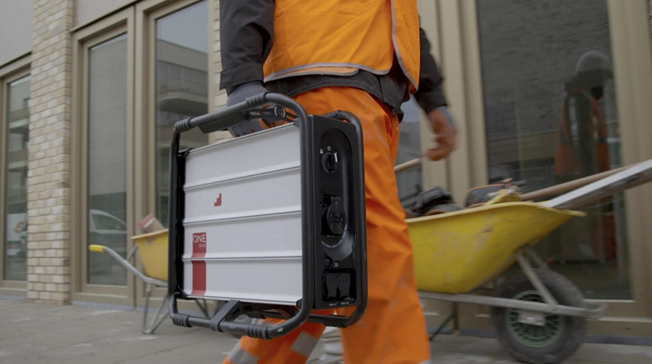
In a world where sustainability, operational excellence and safety have become a global priority, the impetus in the development and implementation of advanced technologies that respond to these challenges is of vital importance. Portable and hybrid battery systems are rapidly becoming key elements in the energy transition.
Why are diesel generators a problem?
Diesel generators have long been the preferred power source for remote and mobile work in construction, especially in areas where there is no access to a power grid, or in cases where the total power demand of the site exceeds the capacity offered by the domestic grid.
However, this solution has major disadvantages that affect both people’s health and the environment, including the emission of toxic gases that are highly harmful to both the health of workers and the environment, pollution from the noise generated, extensive and complex wiring that makes work difficult and increases the risk of accidents, as well as continued dependence on fossil fuels.
Today, we have innovative battery systems that offer a powerful alternative, with great advantages for the health and well-being of workers, as well as benefits in terms of sustainability and the environment, providing a clean, safe, robust and reliable source of energy for construction sites.
What are portable batteries?
Just like the batteries in our cell phones, which we charge every night, portable batteries are devices that store and supply electrical energy autonomously, without the need to be connected to the grid or a generator. These batteries are ideal for off-grid applications, where a clean, constant, robust, silent and reliable power source is required.
These batteries can be used to replace generators with up to 10KW power, allowing them to meet the power needs of various crucial construction tools and equipment such as drills, circular saws, grinders, cement mixers, power lighting towers, and even water pumps, welders and air compressors. They can also meet the power needs of equipment such as air conditioners, lighting and computers, and can be in restoration and remodeling projects where electricity has been temporarily cut.
These portable batteries have many advantages:
- At only 20 kg, the batteries are portable and easy to transport.
- These batteries produce no exhaust fumes and operate quietly.
- They offer high resistance to dust, humidity and extreme temperatures.
- Batteries are fully charged in 2.5 hours. The system includes a modular design that allows for flexible power outputs, remote monitoring, and integration with renewable energy sources.
- Batteries can be easily controlled and monitored remotely via a mobile app.
What are hybrid batteries systems?
Hybrid battery systems combine a diesel or gas generator with a high-capacity battery (40-100KW), optimizing fuel use and reducing emissions. These systems are especially useful in projects of long duration or with high energy demands, where a stable and efficient energy supply is needed. During periods of low demand, the battery supplies the necessary energy, which minimizes the generator’s operating time and consequently reduces both emissions and operating costs.
The flexibility of hybrid systems also allows their integration with renewable energy sources such as solar or wind, further amplifying their environmental benefits.
The main benefits of these systems are:
- During periods of low energy demand, the battery can supply the necessary energy in complete autonomy, which reduces the generator’s operating time, thus significantly reducing emissions.
- By hybridizing a generator with a battery, fuel consumption is minimized, which not only reduces operating costs, but also directly reduces our Scope 1 emissions.
- A battery integrated into a hybrid system allows for quieter operation, which is especially beneficial in city environments or locations where noise pollution is a concern or is limited by regulations.
How are we implementing these technologies at Ferrovial?
The potential of these technologies has been tested in several pilot projects within my company, Ferrovial, where they have demonstrated their ability to transform not only the way we operate, but also the impact our activities have on the environment and the health and safety of our workers.
One of the most significant examples I can share is the use of portable batteries in the construction of a data center. In this project, portable batteries were used to power work tools (saws, concrete vibrators, drills, hydraulic hammers, etc.), reducing the wiring required to reach remote locations on site and even on lifting platforms, increasing operational efficiency, worker health and well-being, and significantly reducing emissions and noise. In addition, these batteries are charged with the Ikongreen system, supplying 100% clean energy, demonstrating their compatibility with renewable energy sources and thus completely eliminating emissions.
Another outstanding example is the Ferrovial Energía construction site in Soria (Spain), where we will carry out a pilot project to hybridize a battery with a conventional generator set to power the site’s work sheds, expecting a reduction in fuel and therefore emissions of up to 40%. These batteries will operate during off-peak hours and the genset will cover peaks.
Portable batteries and hybrid systems are a powerful solution to achieve our decarbonization, health and wellness goals on construction sites in the near term, as they not only improve efficiency and reduce costs, but also represent a powerful tool to transform our operations and move towards a more sustainable and responsible future.





There are no comments yet